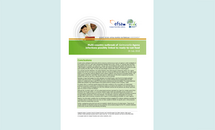Rapid outbreak assessment: Multi-country outbreak of Salmonella Agona infections possibly linked to ready-to-eat food
A multi-country outbreak of Salmonella enterica subspecies enterica serovar Agona (S. Agona) is under investigation in the European Union (EU), with cases retrospectively identified back to 2014. Overall, 147 outbreak cases have been reported by five EU countries, namely, Denmark, Finland, Germany, Ireland and the United Kingdom.
Executive summary
A multi-country outbreak of Salmonella enterica subspecies enterica serovar Agona (S. Agona) is under investigation in the European Union (EU), with cases retrospectively identified back to 2014.
Overall, 147 outbreak cases have been reported by five EU countries: 122 cases since 1 January 2017, and 25 historical cases between 2014 and 2016. The United Kingdom is reporting most outbreak cases (129), with Finland (15), Denmark, Germany and Ireland (one case each) reporting the other cases.
Most persons infected with Salmonella develop diarrhoea, fever, and abdominal cramps in 12–36 hours after infection. The illness usually lasts 4 to 7 days. Although most people recover without treatment, severe infections may occur. Infants, elderly persons, immune-compromised persons are more likely than others to develop severe illness.
Based on the information available, the microbiological evidence suggests ready-to-eat products containing cucumbers as a possible vehicle of infection but so far it has not been possible to identify the specific point in the production chain where the contamination occurred. Further investigations along the food chain are therefore needed to identify the source of contamination.
Until the source of infection and the specific point of contamination along the food production chain have been identified and controlled, new outbreak cases may occur, with a high likelihood that the outbreak strains will re-emerge in early 2019, as observed in the seasonal occurrence of cases in previous years.
A joint rapid outbreak assessment produced by European Centre for Disease Control (ECDC) and European Food Safety Authority (EFSA), published on 26 July 2018, provides further information about the outbreak, including options for response for national health authorities.
Download




